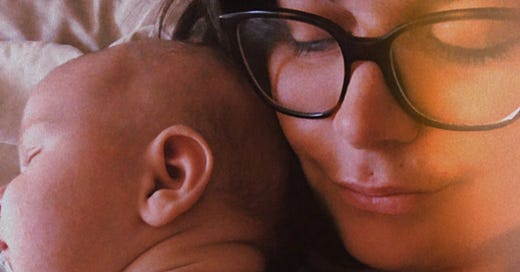“Night confusion” is considered a common occurrence for infants, where they have their “days and nights confused.” Some “experts” say that night confusion happens when your baby wants to be up all night, or when they wake to eat every hour through the night. These same “experts” also suggest that babies don’t develop a circadian rhythm until they’re approximately 3-4 months old.
Neither of my boys have experienced “night confusion,” and I would absolutely not consider eating every hour to be “night confusion.” Newborns need to suckle constantly both for their own health and safety, as well as to establish a good milk supply in those early days. Both of my boys have had very consistent sleep rhythms from the beginning of their life.
Babies in utero use hormones to stimulate birth, so why wouldn’t they be able to produce the proper hormones for sleep? They obviously have ghrelin and leptin hormones (hunger and fullness), oxytocin, and other hormones, so why wouldn’t melatonin be a hormone that is active in those early days?
I honestly believe melatonin is low (or dysfunctional) in babies because of our blue light addiction.
Hormones are regulated by the light spectrum. Babies who are born in heavy blue light (fluorescent lighting in the hospitals, for example) are likely to have their hormones disrupted by artificial light. If babies have an extended stay under fluorescent lighting without access to natural sunlight, their hormones will need time to recover and stabilize.
Dr. Jack Kruse, neurosurgeon and light specialist, says that sunlight exposure is most important in those first few days of life. He says that the combination of colostrum and sunlight turn on the brain and begin optimizing the body’s systems, while the utilization of the fat built up during gestation begins the regulation of hormones in the baby’s body. This means that your baby dropping below its birth weight is perfectly designed. I personally believe that forcing a baby to drink formula or donor milk, instead of colostrum produced by the mother, is a direct disruption to a baby’s body “turning on” and optimizing itself.
Most doctors or pediatricians seem to suggest that babies cannot “handle” direct sunlight. Even in the case of jaundice, they tell mothers to utilize indirect sunlight > sitting in direct sun. They even give out “bilirubin lights,” instead of sitting in the sun.
Babies need direct sunlight. Sun exposure is important to every cell in the body and optimizes cell function. Getting outside for 10-15 minutes (minimum) 1-3x a day with your baby will support them in all of their bodily functions, not just attuning their circadian rhythm.
Here’s ways we have somehow avoided “night confusion”:
Our babies are born at home, without artificial light. Both of my boys were actually born during the day. I spent time in both of my birth portals dancing through sensations in the sunlight before retreating to my “den” to birth our babies. All windows were open, with full light available during the births.
We live by candlelight in the night and avoid screens after sundown. (Disclaimer: As mother, I’m not perfect about this rule, however my husband and I utilize blue blockers. I will take advantage of nighttime to write or do backend work while babes are sleeping) Our children are rarely exposed to nighttime blue light. We rarely use screens around our children’s bedtime in order to optimize sleep. With our second born, he didn’t experience lights at night until he was around 8 weeks old. Instead, I took him to bed surrounded by candlelight during sunset and had him asleep by 7:30.
We do not get out of bed or turn on bright lights during nighttime feeds or diaper changes. We have a small headlamp with a red light feature we use for all nighttime activities. We do not get out of bed for any reason. Diaper changes happen in bed and all feeds are done side lying. With my first born, I let him sleep on my chest for the first two weeks and it was a horrible time for my sleep, so I implemented side lying feeds immediately. We never completely rouse for wakings, so both children go back to sleep and are less disrupted.
Morning sunlight exposure every day. Both of my boys wake around the blue dawn. Our oldest likes to get up and make coffee with dad, eat a morning snack, and begin his day with farm chores. Our infant likes to play with his brother, get a diaper change, and have his first feed. He will then go back to sleep and get up around 9-10 am, when we feed, diaper change, get dressed, and head outside for morning activities, even when it’s cold. Both boys have morning sun before 10:30 am almost every day.
Consistent outside time throughout the day. Both of my boys are outside several times throughout the day, no matter if it’s sunny or cloudy. I don’t prefer to have my infant out when it’s raining, but I will send my toddler outside geared up. Once there is a break in the rain, the baby and I often tromp around with the toddler to get adequate time.
Normal light during nap times. Neither of my babies have had dim or low light during daytime naps — I find this unnecessary for children’s sleep and also contributing to issues in circadian biology. Humans are entirely capable of falling asleep during high-sun hours without it during their sleep.
Baby sleep is not mysterious or difficult ~ we simply need to remember how to tune into our biology and interpret our children’s cues. We are diurnal animals, regulated and attuned by the sun. Go outside if you can now.
PS: If you’re wondering how Hormone (“vitamin”) D factors into melatonin and your baby’s body… read the article I wrote about breastmilk here:
Your breastmilk is perfectly designed for the nourishment of your baby.
Something I see so often in the motherhood journey is the persistent belief or pressure to accept that breastmilk is not enough.




